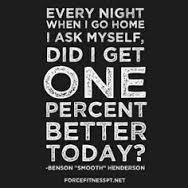I am greatly misunderstood. There are very few people on this Earth who get me. People don’t understand why I don’t like cheese, why I can’t make simple decisions, why I spend so much time perfecting a lesson plan or on my teaching practice. People don’t understand why I’d rather read a book than watch the movie and why I despise conflict, emojis, and all things that bark. I’m misunderstood for my kindness. I’ve been asked, “Why are you so nice?” I’m constantly questioned about waking up at 5:30 to run and why I’m so sensitive. When I was in high school and college, I was misunderstood for my choice not to drink alcohol when all of my friends were. Yesterday, I was misunderstood when I chose Eric Clapton for the winner of my music bracket. There are strong personal reasons why, but this is not my defense on Eric Clapton. I’ll save that for another blog. I’m misunderstood on a daily basis, and I want to tell you I’m okay with that.
This week you’ll find out the last of your college acceptances/waitlists/rejections. I know from experience this week is not easy. I’ve already talked to some of you about what you’re experiencing. One of you even made me tear up when you came to talk to me. I apologize about that, by the way. I guess what I want you to know more than anything is that you might feel misunderstood if you have to face being waitlisted or rejected. It’s easy to say, “Why did she get in and I didn’t?” I know this because I have been in your shoes. I got waitlisted at William and Mary, the school I dreamed of attending, and I questioned their decision.
Are you misunderstood? Absolutely. I have no idea why colleges make the decisions that they do. Sometimes I wish I could just call them up and tell them how I’ve taught you all for four individual classes and how I’ve witnessed some of you grow from self-absorbed freshmen to caring and compassionate seniors. Or how you came into my classroom not wanting to utter a word and now I can’t get you to stop talking in a seminar. Or how much you teach me on a daily basis. Or what amazing people you are. Or how smart you are, how utterly hardworking and creative. I can't do that, and so I just try to look at any college rejection that my students face as being misunderstood.
You see, when it comes down to it, it won’t matter where you go because wherever you do end up, they are going to be lucky to have you and you are going to do great things. I know. I’ve spent four classes teaching you. That’s 360 days of educating you. Sorry...that is an awful lot of Kelly Pace.
Have you been misunderstood by some of these colleges? Absolutely. When I studied Ralph Waldo Emerson in college (one of my favorite writers because of his idealism), he wrote something that has since resonated with me: ‘To be great is to be misunderstood.” He proceeds in his essay "Self-Reliance" to list a litany of people who went on to do great things because they were misunderstood. Colleges may not understand all you have to offer them, but maybe that’s what makes you great. And wherever you do end up, whatever professors have you as their students, are extraordinarily lucky. I know. I understand. I have experienced it firsthand.





